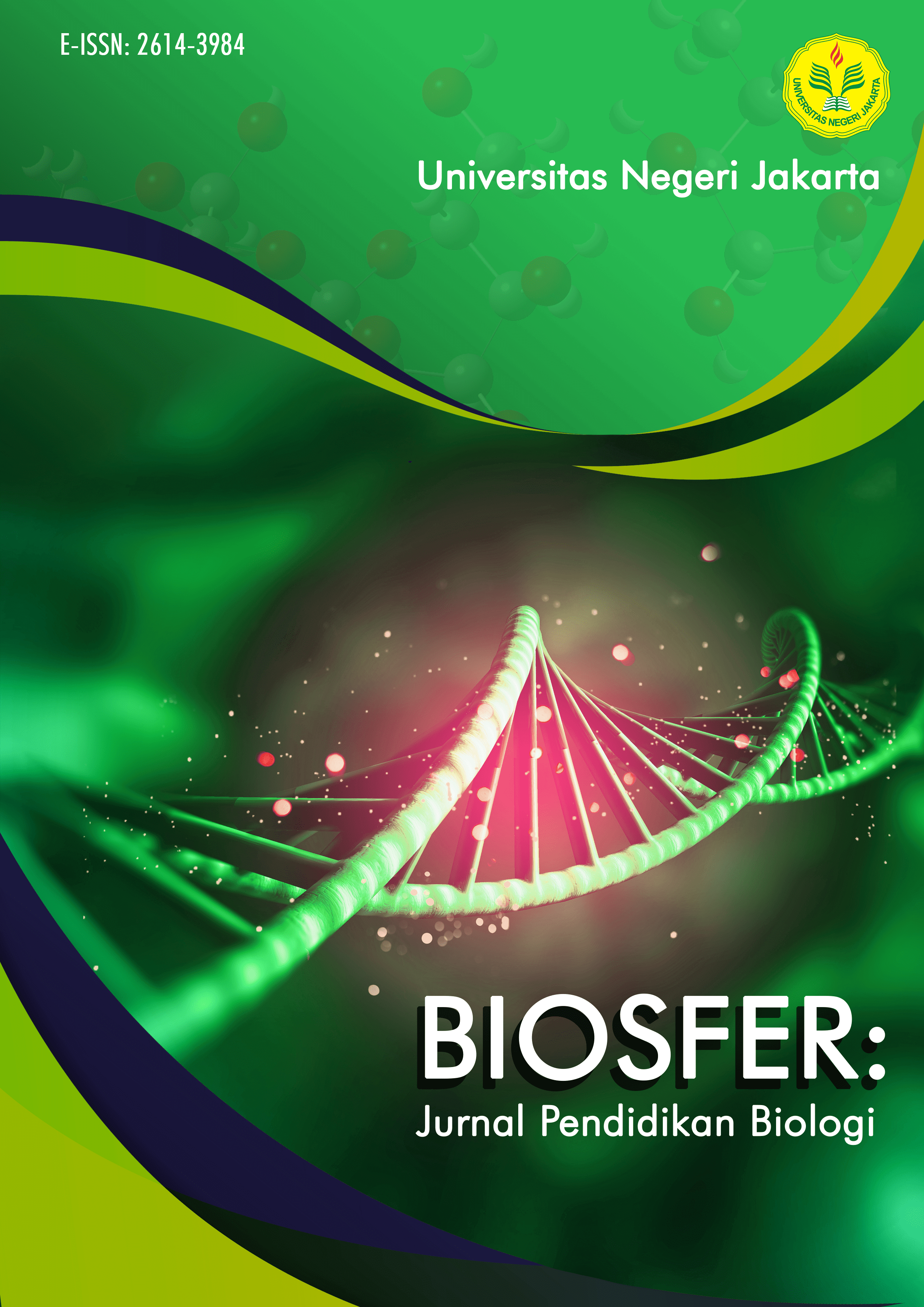How CCDA instrument analyzed science pre-service teachers’ prior knowledge?
DOI:
https://doi.org/10.21009/biosferjpb.18247Keywords:
Cell cognitive diagnostic, Discrimination index, Difficulities index, Validity, ReliabilityAbstract
Increasing the effectiveness of learning is done by exploring the initial understanding of science teacher candidates for the concept of cells to be studied. Exploring the prior knowledge of science teacher candidates about cell concepts can be done using the Cell Cognitive Diagnostic Assessment (CCDA) instrument.This study aims to determine the effectiveness of the CCDA instrument that has been developed. The research sample (n = 163) was student science teacher candidates coming from the Department of Chemistry Education, Physics Education, and Biology Education, Faculty Teaching Training and Education, Sriwijaya University, Indonesia. The topics tested include the structure and function of cells, cell membranes and molecular transport, cell reproduction, and cell communication. The results showed that all the items developed were valid, with a high level of reliability (0.86), very good discrimination index (0.44), and a balance was found between the number of questions classified as difficult and moderate. Although the research results show that this instrument has been valid and reliable, it still needs to be improved on the items so that they can be used in the future.
References
Khasanah, M., Budi, E., & Fahdiran, R. (2015). Desain Sistem Elektrodeposisi Untuk Proses Pelapisan Ni-TiAlN Pada Substrat Tungsten Karbida. E-Journal.
Agung, Hermawan. (2009). Karkterisasi Sifat Mekanis Bahan Pahat Potong Baja HSS yang Dilapisi TiN dengan Teknologi Sputtering dc. Yogyakarta: Universitas Sanata Dharma
Erni, Theresia. (2007). Deposisi Lapisan Tipis Aluminium (Al) Pada Substrat Kaca dengan Teknik Evaporasi dan Karakterisasi Optiknya. Yogyakarta: Universitas Sanata Dharma
Budi, E., Ksatriotomo, B., Restu, A., Muarief, M., Permatasari, A. L., Sugihartono, I., & Budi, A. S. (2015). ANALISIS KOROSI PADA LAPISAN TIPIS KOMPOSIT NIKEL-NITRIDA HASIL ELEKTRODEPOSISI. Spektra: Jurnal Fisika Dan Aplikasinya, 16(1), 39-41.
Aminah. (2011). Penggunaan Ethylene Tetra Acetic Acid (EDTA) dalam Lapisan Elektroplating Campuran Zn-Ni-Fe pada Substrat Cu. Universitas Sebelas Maret:Surakata
Hartomo, J. Anton, (1992),Mengenal Pelapisan Logam (Elektroplaiting), Andi Ofset, Jogjakarta.
Budi, E. (2016). POTENSI PEMBENTUKAN LAPISAN SUPER DAN ULTRA KERAS SENYAWA KOMPOSIT NITRIDA MENGGUNAKAN KAIDAH ELEKTRODEPOSISI. Spektra: Jurnal Fisika Dan Aplikasinya, 1(2), 187 - 194.
Niu, J., Liu, X., Xia, K., Xu, L., Xu, Y., Fang, X., Lu, Wei. (2015). Effect of Electrodeposition Parameters on the Morphology of Three-Dimensional Porous Copper Foam. International Journal of Electrochemical Science.
Ade Lina P. (2015). Pengaruh Pengadukan pada Proses Pelapisan Ni-TiAlN Menggunakan Teknik Elektrodeposisi untuk Perlindungan Bahan Tungsten Karbida Terhadap Korosi, Prosiding Seminar Nasional Fisika (E-journal) SNF 2015, Vol. 4, Oktober 2015
Lazic, M.S., Simovic, K., Miskovic-Stankovic, V.B.dan Kicevic, D. (2004). The Influence of the Deposition Parameter on the Porosity of Thin Alumina Films on Steel. Jurnal Serbian Chemistry Society 69, 3, 239-249
Lu, W., Guang, P., Li, K., Yan, P., Yan, B. (2013). Effect of Bath Temperature on the Microstructural Properties of Electrodeposited Nanocrystalline FeCo Films. International Journal of Electrochemical Science.
Kumar, S., Pande, S., Verma, P. (2015). Factor Effecting Electro-Deposition Process. International Journal of Current Engineering and Technology.
Downloads
Published
How to Cite
Issue
Section
License
The Authors submitting a manuscript do so on the understanding that if accepted for publication, copyright of the article shall be assigned to Biosfer: Jurnal Pendidikan Biologi (Biosferjpb) and Departement of Biology Education, Universitas Negeri Jakarta as publisher of the journal.



